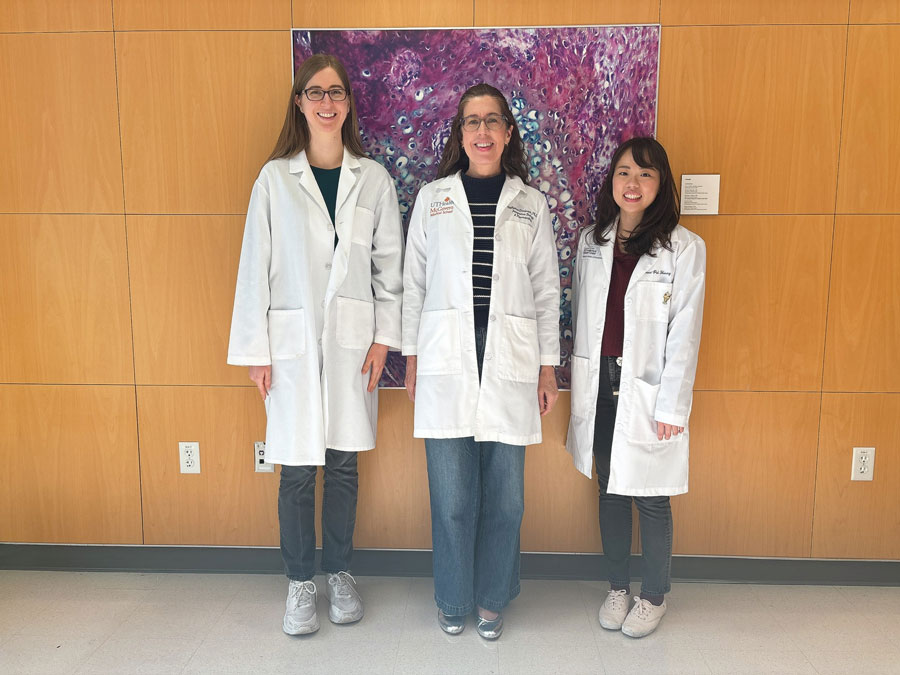Denicourt publishes research on how cells make proteins

Recent research from the lab of Catherine Denicourt, PhD, associate professor in the Department of Integrative Biology and Pharmacology, uncovers the vital role of the enzyme TRMT1L in the process of protein production.
The Denicourt lab research focuses on understanding how cells make proteins, and the study “TRMT1L-catalyzed m22G27 on tyrosine tRNA is required for efficient mRNA translation and cell survival under oxidative stress,” has been published in Cell Reports.
The study delves into mRNA translation, a process that converts genetic information into proteins. A key player in this process is tRNA, a molecule that helps decode genetic information.
“tRNAs are often modified with small chemical changes that help them function properly and ensure the translation process works correctly,” Denicourt said. “However, when these modifications are not properly regulated, it can lead to changes in protein production and disease development.”
The team discovered that TRMT1L is crucial for modifying tRNAs and regulating protein production. One important modification, called m22G, occurs at a specific position on the tRNAs that decode the amino acid tyrosine.
“We found that TRMT1L is responsible for this modification, as well as maintaining other modifications like acp3U and D on certain tRNAs,” Denicourt said.
The absence or malfunction of TRMT1L leads to several problems, including decreased stability of tyrosine tRNA, reduced overall efficiency of protein production, and impaired cell survival under stressful conditions such as oxidative stress. This type of stress is observed in many diseases, including neurological disorders and cancers.
“Our research highlights the importance of TRMT1L in ensuring that tRNA modifications are maintained, which in turn supports efficient protein production and helps cells cope with stress,” Denicourt said.
To elucidate TRMT1L’s role, the researchers employed advanced genomic tools and mass spectrometry techniques. Notably, Oxford Nanopore technology enabled them to directly sequence tRNA molecules and precisely identify all present modifications. By genetically deleting the TRMT1L gene in human cells, they mapped the resulting missing modifications on tRNAs, thus elucidating TRMT1L’s function.
The study addressed a longstanding mystery in the field of RNA modification: the function of the m22G modification at position 27 of tyrosine tRNA and the enzyme that catalyzes it. Using a combination of advanced genomic techniques and mass spectrometry, the team identified TRMT1L as the enzyme responsible for the m22G modification on tyrosine tRNA, filling a significant gap in the understanding of RNA modification biology.
Furthermore, the researchers discovered that a deficiency in TRMT1L disrupts other modifications on tRNAs, such as acp3U and dihydrouridine, indicating that TRMT1L plays a crucial role in a broader tRNA modification circuit.
“Proper regulation of these modifications is essential for cellular homeostasis, as evidenced by the significant reduction in tRNA tyrosine levels and protein production rates in cells lacking TRMt1L,” Denicourt said. “TRMT1L is vital in protecting cells from oxidative stress-induced cell death.”
Moving forward, the lab will delve deeper into the role of TRMT1L in the development of breast and endometrial cancers. Their findings indicate that TRMT1L, along with other tRNA-modifying enzymes it regulates is dysregulated in a significant proportion of aggressive subtypes of these cancers.
“Our aim is to investigate whether TRMT1L contributes to cancer progression through a process known as translational reprogramming, whereby sets of proteins are produced to support cancer progression,” Denicourt said. “The research has the potential to lead to new avenues for cancer therapy, providing hope for more effective treatments by targeting the regulation of tRNA modifications.”
Graduate student Sseu-Pei Hwang, and research assistant Katherine Barondeau, were the primary drives of the research. Additionally, the research was a collaboration between Denicourts lab and the lab of Jeffrey T. Change, PhD, in the Department of Integrative Biology and Pharmacology; and Patrick A. Limbach, PhD; at the University of Cincinnati, and his graduate student Cassandra Herbert.